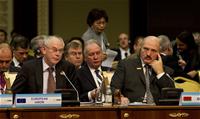EU reacted sharply against the expel of OSCE by Belarus
Angel Shoilev Junior, January 7, 2011
 The EU is preparing a firm response to Belarus's president Alexandr Lukashenko's actions in recent weeks. The situation in Minsk deteriorated after the presidential elections on December 19th last year, won by Lukashenko with almost 80% of the votes. Over 30,000 people took part in protests against the results and attempted a storm of the government's building. The result is a lot of injured people and over 600 arrested, including the opposition's candidate Vitaliy Rimashevksi.
The EU is preparing a firm response to Belarus's president Alexandr Lukashenko's actions in recent weeks. The situation in Minsk deteriorated after the presidential elections on December 19th last year, won by Lukashenko with almost 80% of the votes. Over 30,000 people took part in protests against the results and attempted a storm of the government's building. The result is a lot of injured people and over 600 arrested, including the opposition's candidate Vitaliy Rimashevksi.
After quelling the protests against election results by police violence and mass arrests, Lukashenko terminated mission of the Organisation for Security and Cooperation in Europe (OSCE) in Belarus. The reason was that the OSCE did not recognise the legitimacy of the elections. On its part Minsk announced that the OSCE had completed its work in the country.
European Union's High Representative for Foreign Affairs Catherine Ashton and Secretary of State Hillary Rodham Clinton, however, disagreed. In a joint statement they said: "The mandate of the mission is not completed, as the OSCE's critical assessment of the presidential elections indicates. The elections and their aftermath - particularly the continuing detention of presidential candidates and new detentions and raids targeting the media - represent a step backwards in the development of democratic governance in Belarus". The first diplomats of the EU and the US insisted also on the immediate release of all detainees.
Audronius Ažubalis, foreign minister of Lithuania, which is presiding the OSCE currently, called on Belarus to reconsider its decision, arguing that the organisation still had a lot of work in the country. He described OSCE's presence in Minsk as "vital".
In the meantime the European Union is preparing a list of over 100 Belorussian officials, including President Lukashenko, who will be banned from getting EU visas, the EUobserver wrote. EU embassies in Minsk are currently preparing the list which will be discussed at the Political and Security Committee in Brussels on Friday. According to the website several member states, like the Czech Republic for example, insist on an urgent meeting of foreign ministers next week so that the list is quickly approved but others, like Germany and Sweden, prefer the issue to be solved at the regular Foreign Affairs Council on January 31st.
This is not the first measure against Belarus - in 2006 for similar reasons Lukashenko and 40 other officials were banned from getting EU visas, but most of them were removed from the list two years later.